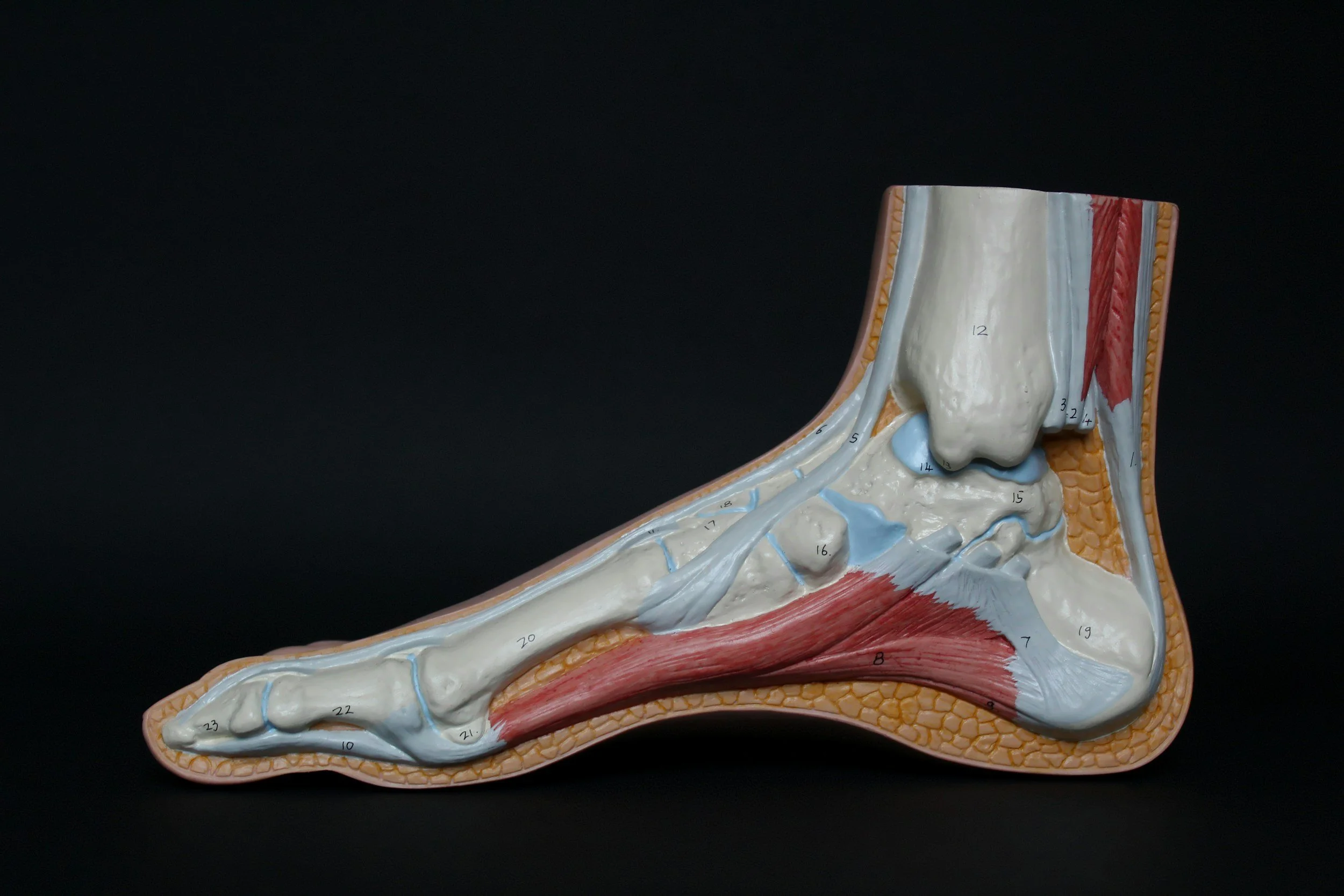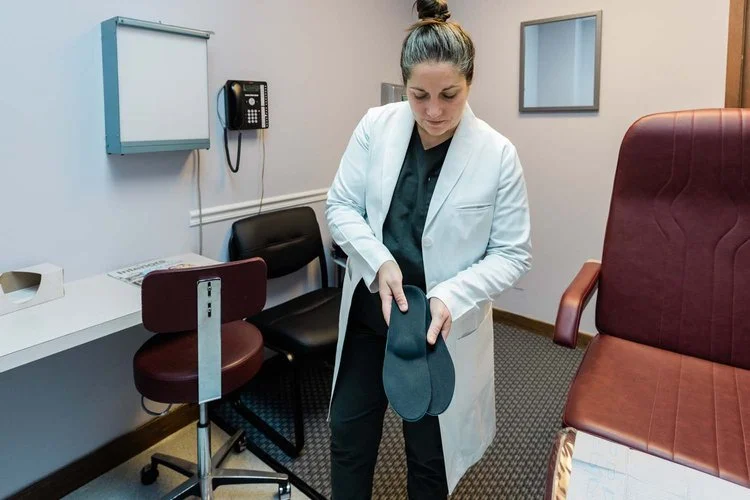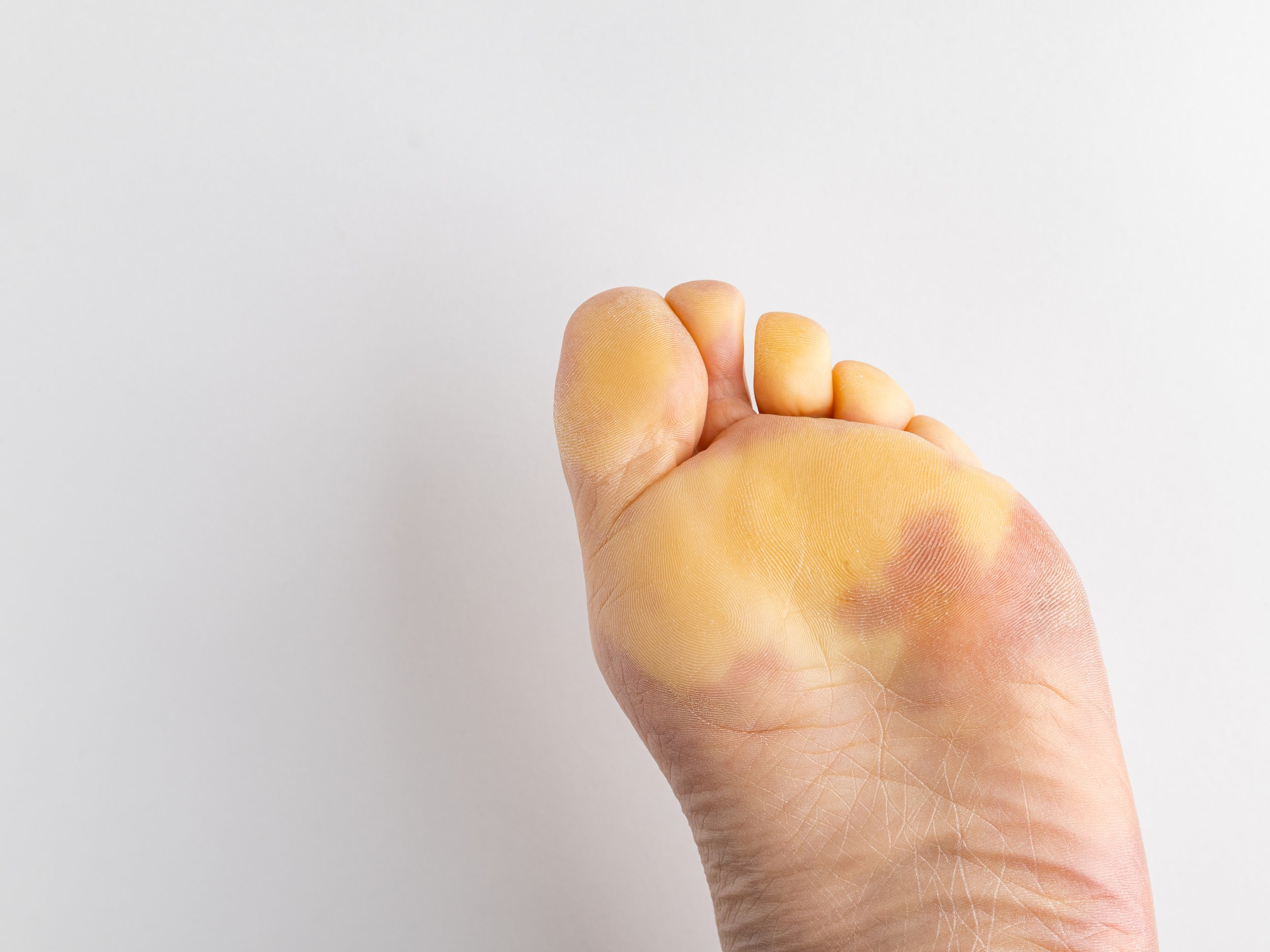The Foot–Body Connection: How Diabetes, Chronic Kidney Disease, and Obesity Impact Foot Health. What Your Podiatrist Wants You to Know.
Your feet are on the frontlines of your health and wellness. Like the proverbial canary in a coal mine, they often reveal early signs of what’s happening on the inside.
Foot pain, numbness, swelling, or slow-healing wounds might seem like isolated problems, but they can actually be linked to chronic health conditions like diabetes and chronic kidney disease (CKD). If you experience any of these, don’t ignore them!
Your friendly neighborhood podiatrist can help you understand and address any issues you may be facing, and being preventative and proactive is a savvy strategy when it comes to your optimal health!
Understanding how conditions like CKD, diabetes, and obesity affect your feet can help you protect your mobility and prevent serious complications down the road.
Your body’s systems are intricately connected and work in concert with one another. With such a complex and coordinated network, one issue can create a domino effect that ripples throughout your entire system.
At City Step Podiatry, we believe knowledge is power when it comes to making informed healthcare decisions. That's why we want to help you understand the links between obesity, diabetes, and chronic kidney disease and how they can interact to impact your foot health.
How these chronic, systemic conditions affect your feet
You rely on your feet, but have you ever stopped to consider what they rely on?
Your feet require many things to stay healthy and keep you standing and moving without pain.
Some of the key things your feet need to stay healthy include:
A steady supply of blood flow
Strong, stable bones
Balanced fluid levels
Flexible, fortified connective tissue
And intact nerve function
When chronic conditions disrupt any of these systems, your feet often feel the effects first. This can quickly lead to pain, discomfort, and changes in their ability to function.
This is especially true if you have one or more of the conditions this article is focused on.
But why? In a nutshell—
Diabetes can damage your blood vessels and nerves.
Obesity adds extra pressure on your feet and causes inflammation.
Chronic kidney disease (CKD) affects your circulation, nerves, and bone health.
Many folks don’t realize their foot discomfort or numbness is connected to these conditions. Recognizing the link is the first step to protecting your foot health.
You deserve a deeper dive into how and why these specific conditions impact the feet—we’ve got you covered.
How chronic kidney disease impacts your feet
If you have chronic kidney disease (CKD), your kidneys are less able to filter waste and balance the fluid levels in your body.
Over time, this can lead to several foot-related issues, including:
Nerve damage (peripheral neuropathy): Chronic waste buildup can harm your nerves, causing tingling, burning, or numbness in your feet.
Poor circulation: Reduced blood flow means wounds heal more slowly and infections are more likely.
Swelling (edema): Fluid buildup in your legs and feet can stretch your skin and make walking uncomfortable.
Weakened bones: Imbalances in minerals like calcium and phosphate can make the bones of your feet more fragile.
Research shows that people with CKD are more likely to develop foot ulcers and infections, even if they don’t have diabetes. Up to half of patients on dialysis experience nerve damage in their feet, increasing their risk for injury.
Because symptoms like numbness or swelling can develop gradually, it’s important to monitor your feet regularly and seek professional care when changes occur. Your podiatrist can help you keep close tabs on this issue, monitoring and maintaining your foot health and wellness.
What diabetes means for your feet
Diabetes is one of the most common causes of foot problems. Chronically elevated blood sugar levels damage small blood vessels and nerves, which affects your sensation and circulation.
If you have diabetes, some foot issues you might experience include:
Neuropathy: This can cause burning, tingling, numbness, or sharp pain in your feet.
Slowed wound healing: Even minor cuts or blisters can take longer to heal and are at risk of infection.
Skin changes: Dry, cracked skin or thick calluses can develop due to nerve changes.
Poor blood flow: Narrowed arteries reduce oxygen and nutrients reaching your feet.
Nearly half of people with diabetes develop neuropathy, making it essential to check your feet daily and seek regular podiatric care. If you also have CKD, your risk for serious foot complications increases further.
Dr. Young specializes in helping patients with diabetes address and manage their risks for foot issues and complications. Read our helpful blog about diabetic foot care, and book with Dr. Young easily online for personalized support.
Obesity’s effect on your feet
Carrying extra weight places added stress on your feet, which can cause pain and increase your risk for injury.
But it’s not just about pressure—obesity also contributes to inflammation that affects tissues throughout your feet.
Common foot issues linked to obesity include:
Plantar fasciitis: Inflammation of the tissue along the sole of your foot, causing heel pain. Read our helpful deep dive blog to learn all about this condition.
Joint wear and tear: Extra weight can speed up the progression of arthritis in your foot and ankle joints and increase its symptom severity.
Tendon problems: Chronically overloaded tendons may weaken over time, leading to fallen arches or flat feet.
Gout: an inflammatory form of arthritis, gout in the feet is more common in those who are overweight or obese. Read our recent article to learn more about this common condition and its prevention and treatment.
Skin breakdown: Pressure on certain areas of your feet can cause calluses and increase your risk for foot ulcers.
Studies show that a higher body mass index (BMI) is associated with increased foot pain and reduced mobility (especially in middle-aged women), making weight management an important part of protecting your foot health.
At City Step Podiatry, we’re not here to judge you or preach to you. We understand that weight management is a complex and multifaceted issue. We’re here to inform and support you to achieve your foot health and wellness goals, whatever that looks like to you. We’ll listen and help you create a podiatry treatment plan that works for you.
Monitoring your feet for signs and symptoms
When it comes to your feet, noticing changes early and seeking assessment and treatment from a qualified professional can make a big positive difference in your overall health and wellness.
Common symptoms of developing foot issues and conditions include:
Numbness or tingling
Burning or sharp foot pain
Swelling or unusual puffiness
Skin color changes or shiny skin
Persistent calluses, blisters, or sores
Slow-healing wounds
Weakness or difficulty balancing
If you experience any of these, don’t wait—connect with your trusted podiatrist to discuss what you’re noticing. They can help you determine the underlying cause of these issues and work with you to develop a personalized, comprehensive treatment plan to address them proactively.
Preventative foot care: How to protect your feet and promote their health
They say an ounce of prevention is worth a pound of cure.
Taking good, proactive care of your feet is especially important if you have CKD, diabetes, or obesity.
Thankfully, it’s not difficult to accomplish this goal. Follow our top foot health tips to keep your feet healthy and well:
Check your feet daily
Sometimes, just putting eyes on your feet can help you catch any issues early on.
Look for cuts, blisters, redness, or swelling. Use a mirror to see the bottoms of your feet or ask for help if needed. Taking photos can also help you monitor and track any changes over time.
Choose supportive shoes
Choose shoes that fit well, offer cushioning, and support your arch. City Step Podiatry has LOTS of great suggestions in our Footwear Focus blog series.
Custom orthotics may be helpful if you have foot deformities or neuropathy. We offer those, too, and our custom orthotic offerings are second to none.
Keep your sugars in check
Keeping your blood sugar within your target range helps protect your nerves and circulation. Follow your doctor’s recommendations and check your sugars regularly to keep them within a healthy range.
Lean into kidney health
Follow your doctor’s advice on medications, blood pressure, and diet to preserve your optimal kidney function and reduce complications from CKD.
Adopt healthy habits
A body in motion tends to stay in motion. Not only that, but staying active and eating a balanced diet strongly contribute to our overall health and wellness.
Low-impact exercises like walking, swimming, or cycling combined with balanced nutrition can reduce stress on your feet and promote their health.
Work with a podiatrist
You don’t need to tackle foot health alone! Your podiatrist is happy to help you troubleshoot and develop a personalized plan to achieve your health and wellness goals.
Plus, routine visits can help catch problems early.
Wondering when and why you should seek out support from a podiatrist?
It’s a good idea to schedule a podiatry appointment if you experience:
New or unexplained foot pain
Numbness or tingling in your legs, toes, or feet
Cuts, blisters, or sores that don’t heal
Changes in the shape of your foot or toes
Signs of infection, such as redness, warmth, or discharge
Early diagnosis and treatment from a podiatrist can help prevent serious complications from developing, especially when you’re managing chronic health conditions like diabetes and CKD.
Podiatrist treatments to explore may include:
Custom orthotics—at City Step Podiatry, our custom orthotics are second to none when it comes to giving your feet and ankles the personalized support and comfort they deserve. We’ll work closely with you to ensure your pair fits like a dream and address all your foot health and wellness issues, needs, and concerns.
Digital x-rays—To ensure top-quality diagnosis and personalized treatment, we may want to get imaging of your feet and/or ankles. Thankfully, we can take your X-rays easily in the office during your appointment, saving you time and energy.
Radial Shockwave Therapy (RSWT)—this effective, proven treatment modality offers an innovative, non-invasive way to promote tissue healing and treat a variety of common foot conditions (including plantar fasciitis). Treatments are quick, easy, and typically painless. Patients often experience an immediate sense of relief and symptom reduction using this approach. City Step Podiatry is proud to offer top-quality RSWT services in our convenient downtown Chicago clinic.
Laser therapy—targeted lasers can safely and effectively treat a variety of foot and ankle issues, including stiffness, inflammation, and pain. Laser therapy can also enhance circulation and promote cellular repair, leading to improved wound healing. Best of all, treatments are known to be both soothing and fast. Dr. Young has advanced training and certification in Remy Class IV laser therapy and offers these cutting-edge treatments in-house.
When you trust City Step Podiatry with your foot and ankle care in Chicago, your treatment plan will always be custom-tailored to your goals. We’ll work with you to choose your best way forward, taking into account your medical history, preferences, and needs. We’re here to guide you, without judgement.
The bottom line is: Your foot health is closely linked to your overall health. By understanding the connections between your foot health and issues like diabetes, CKD, and obesity, you’re better able to take proactive steps to protect your feet, reduce pain, and stay active.
But you don’t have to walk this path alone. The right support and guidance from a podiatrist can make a real, meaningful difference in your quality of life. Dr. Young and the City Step Podiatry team are here to support you every step of the way.
City Step Podiatry specializes in caring for patients with complex foot health needs. From advanced diagnostics to personalized treatment plans, our team is dedicated to helping you maintain your mobility and comfort. Book your appointment easily online, learn more about our insurance policies, and check out our other helpful blog posts.
City Step Podiatry is here for you! Reach out today to schedule your visit and treat your feet to the care they deserve.









